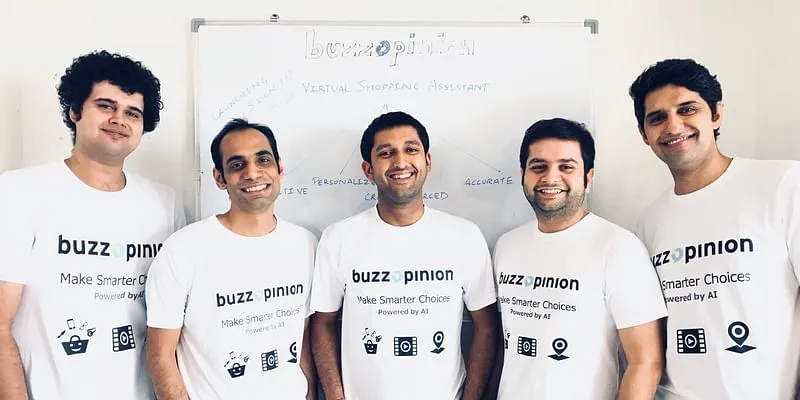
JioGenNext
View Brand PublisherBuzzo.ai is changing the way people shop online. Here’s how
Acquired by Haptik last year, Buzzo.ai enables a Conversational AI Assistant to understand a customer’s requirements and make relevant recommendations after naturally conversing with them – essentially simulating the behavior of an in-store sales assistant.
While on the lookout for a new phone a few years ago, Anand had to carry out thorough research by navigating through a massive maze of user reviews on shopping sites, expert videos on Youtube, and price and function comparisons to zero-in on the right product.
During this phase around his purchase, Anand’s friend Vivek recounted how he had fallen into an advertiser’s trap and ended up with a phone whose battery could barely get him through half a day, while another friend, Parth, joked about how he was stuck with a mobile that could easily double up as a heating press for ironing clothes.
This made them realise that deciding what to buy in this age of abundant choices was still a big pain-point for customers that was not limited just to mobile phones alone. The friends were convinced that given the wealth of information present within the user reviews, they could come up with a smart algorithmic way of generating insights that would make the decision-making process much simpler.
This was the founding idea behind BuzzOpinion, which later became Buzzo.ai.
The founders, Vivek Arya and Anand Ramachandran, both IIT Bombay Alumni, had previously built a Natural Language Processing (NLP) and semantic search startup, MakeSense Technologies, which was acquired by India's largest job portal Naukri.com (Info Edge India Ltd). Backed by that experience, and a core team of three Delhi College of Engineering alumni, Ankit Arya, Parth Bhalotia and Pranav Tyagi, then began their journey towards making consumer choices a more efficient and hassle-free experience for people.

The growth story
“We initially started-off as a consumer-facing website that helped people buy electronics. Later on, Pranav came up with the idea that instead of users having to search and browse through our recommendations and insights, it would be amazing if we could make this into an AI bot with whom any user can simply talk to over chat and voice. Thus came the idea of Buzzo.ai - conversational AI for e-commerce. It’s essentially like having an expert sales professional who will help buyers navigate through technical specs, share insights from user reviews, and find what is the right choice for the buyer’s specific needs,” said Anand.
In September 2019, Buzzo.ai was acquired by , the Reliance Jio-backed enterprise Conversational AI platform. “Aakrit Vaish (CEO & Co-founder - Haptik), reached out to us at a time when we were looking to scale. While Haptik's technology was primarily focused on customer service AI solutions, buzzo.ai was into sales-related AI solutions, which perfectly complemented Haptik’s offerings,” said Anand.
Anand recounts that conversational commerce was still a wide open space at the time, and that they were confident that their approach would lead to genuine end-user impact.
“Combining that with the world moving towards being voice-first, we knew we were on to something. As creators of technology, the only way to see the fruit of our work is with massive scale. And that’s what got us excited about Haptik, particularly after their alliance with Reliance Jio.”
Buzzo.ai, now the Haptik - Conversational Commerce team, enables an AI assistant to make relevant recommendations by understanding a customer’s requirements after naturally conversing with them– essentially simulating the behavior of an in-store sales assistant.
The AI engine can carry out natural conversations with a consumer to understand his specific requirements, match it to deep insights from product descriptions and user reviews, and accordingly come up with precise recommendations. The engine can further answer any follow-up questions that the customer might have on any of the shortlisted choices.
“Our Conversational AI Assistant functions like an unbiased expert with in-depth knowledge of all products, and user reviews with whom a shopper can simply chat for a few minutes to decide what to buy,” said Vivek.
The team is guided by the mission to be the de facto platform to enable companies to rapidly deploy intelligent systems to extract deep, brand-specific insights from all available data and enable rich, natural language interactions with users.
The JioGenNext Advantage
Helping them achieve this mission is the JioGenNext accelerator programme. “Buzzo.ai was part of the 2017 cohort of JioGenNext programme. It helped us build our web-scale conversational intelligence technology despite being bootstrapped. We were given access to world-class mentors as well,” said Anand.
They also benefited from sessions related to User Experience and Customer Experience given that all the co-founders came from a technical background, and getting an insight into the customer mindset was much needed. Apart from the sessions, the programme also helped Buzzo.ai connect with potential investors and acquisition opportunities, while also boosting visibility. Despite being part of the cohort three years ago, Anand said the alumni network is very strong.
“It helps us network, the information exchange is very healthy and it also connects us to third party vendors and partners.”
Onward and upward
Since its acquisition by Haptik, Buzzo.ai has not only scaled up to a 15-member team, but has also scaled up from being a product to a business. Post acquisition, they have been able to build a strong pipeline of prospective clients too.
“We are in discussions with enterprises across multiple e-commerce categories including electronics, fashion, beauty, healthcare, baby care, furniture, automobiles, food ordering, hotel booking, car rentals etc. We have also developed an analytics dashboard that gives our clients a visual representation of key metrics pertaining to user adoption, engagement and conversions.”
The team has also been developing an interface for clients to view/edit response templates, referenced variables and descriptive content. Plans are being laid out for using a Machine Learning + Personalisation Model for enhancing conversation flows based on past user interactions and adding Multi-lingual support (foreign languages/regional Indian languages) in the next 12-18 months.
The product also won the ‘Outstanding Product - Conversational Commerce’ award at the Global Business Excellence Awards.
Acquiring Buzzo.ai has also helped Haptik establish sales IVA (Intelligent Virtual Assistant) solutions to drive the return on investment ROI by helping brands boost revenue. Conversational commerce enables better product discovery through a recommendation engine to drive transactions via digital channels; while the Lead Generation IVA is a 24/7 virtual sales agent that helps generate warm leads by engaging website visitors.
What sets Buzzo.ai apart
In the last few years, the sector has seen several new players emerge. However, what sets Buzzo.ai apart is the depth of domain knowledge that is built-in.
“The information that we hold is not limited to basic information of products. We extract deep aspects too. For instance the quality of low-light photography in a phone, how good is the phone to play games like PUBG etc. Most other platforms take a horizontal approach towards domain knowledge, but ours is an in-depth vertical one.”
With the introduction of Alexa, Google Assistant and other voice assistants, people are becoming more comfortable with voice commands, said Vivek. While the application of these voice assistants started off with simple tasks such as setting alarms, it is now moving into more complex uses such as shopping as people are looking for more experiential products and services. However, there are unique challenges that the company faces in India.
“In India, a large percentage of the population is still not engaged in e-commerce. While they are active users of WhatsApp or Facebook, they haven't jumped on the online shopping bandwagon yet, and here is where we see that as a big opportunity. If we have to tap into this segment, then making our product intuitive, natural and simple is important. Another challenge here is the many languages and accents in our country, and we are focusing on those areas as well,” added Anand.







